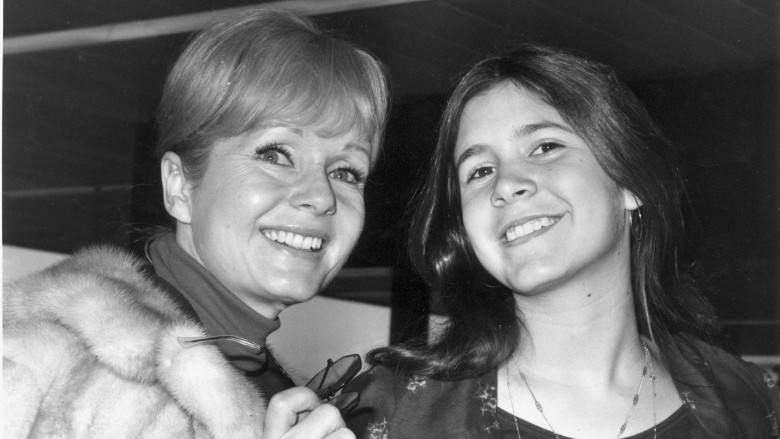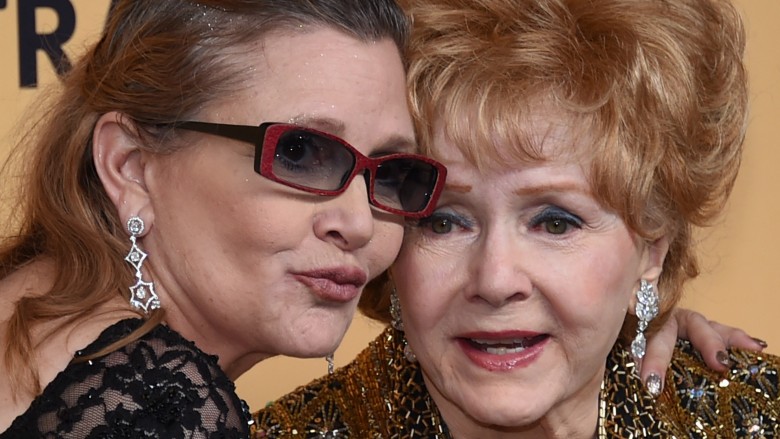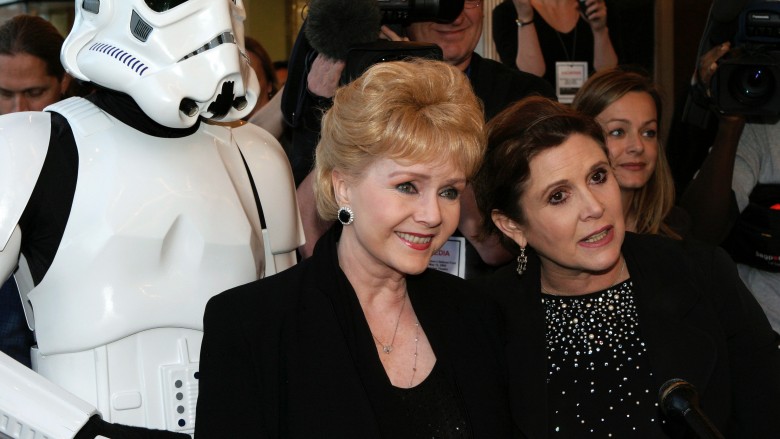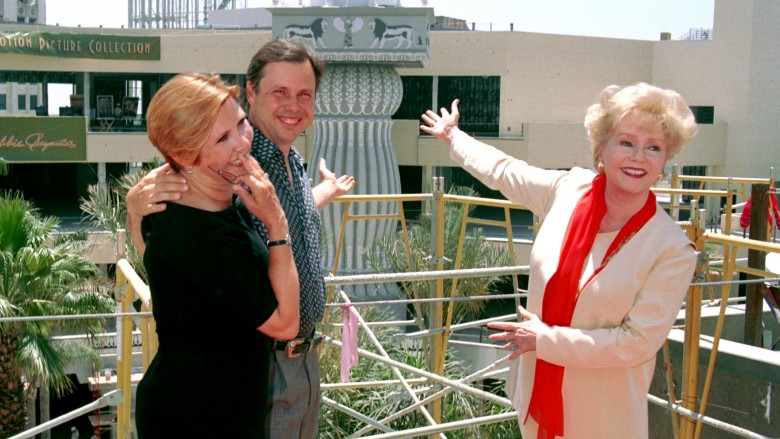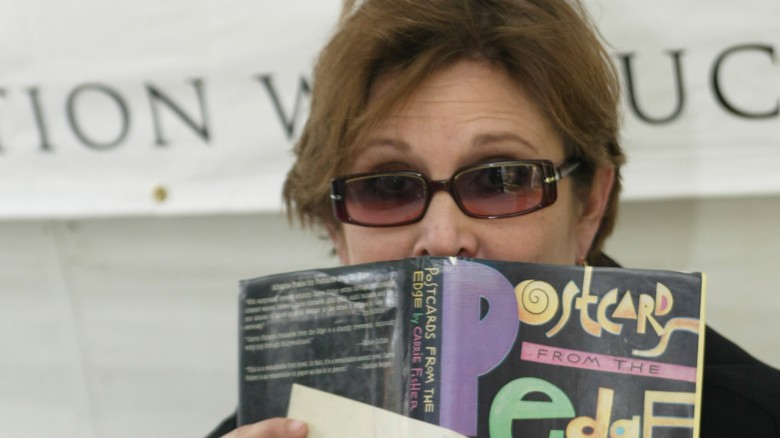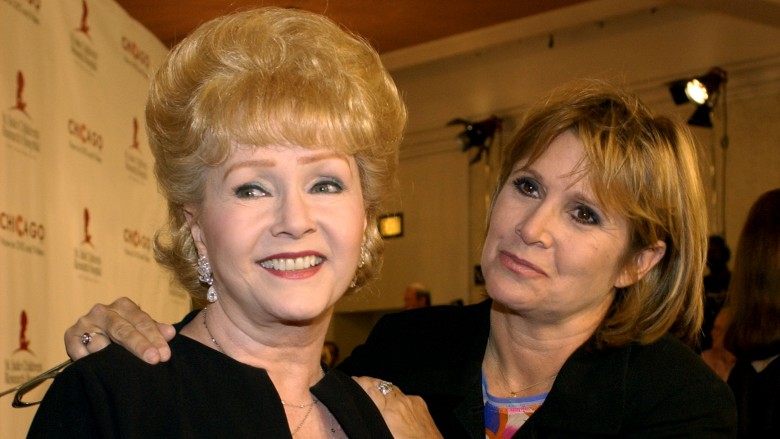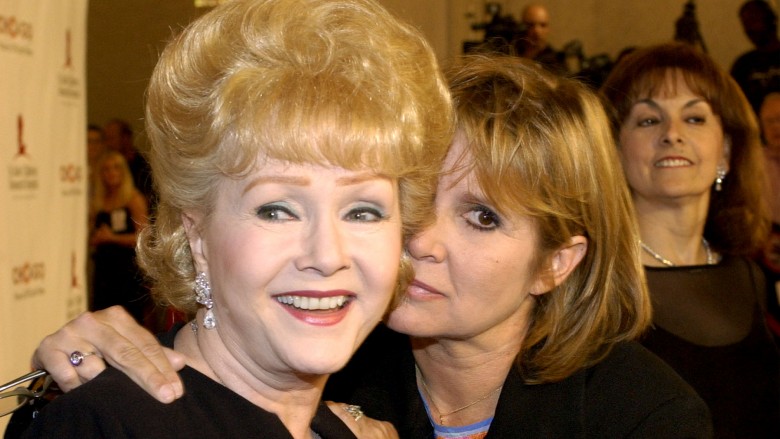The Truth Behind Carrie Fisher And Debbie Reynolds' Relationship
Carrie Fisher had what her brother Todd Fisher called "a beautiful love story" with her mother Debbie Reynolds before both actresses passed away a day apart from each other in December, 2016. As Fisher herself said during a couch cuddle session in the HBO documentary Bright Lights, which heartbreakingly highlights their lives as next-door neighbors and sassy gal pals at the end, "I am my mom's best friend." Reynolds herself echoed that sentiment, but with a touch of that wild wit that made the pair so special to their fans, when she said, "I share everything with my daughter... especially the check."
Their storybook bond wasn't always so unshakable, though. In fact, the mother-daughter duo went through their fair share of ups and downs along their life's journey together, the trials of which only strengthened their ultimate respect and admiration for one another to the end of their days. Here's the truth behind Carrie Fisher and Debbie Reynolds' complicated, amazing relationship with one another.
Born to the background
A lot of celebrities' children grow up to do things completely unrelated to the spotlight, and for Carrie Fisher, her parents' fame certainly took the kind of toll on her that might've driven others away from show business altogether. Fisher was born to Reynolds and her then-husband singer Eddie Fisher, and the two were so popular at the time that news of Carrie's impending birth even made the front page of the Los Angeles Times. But it wasn't as auspicious a start in life as some might expect.
She wrote of her immediate entry into the world of fame at birth, "When I was born, my mother was given an anaesthetic because they didn't have epidurals in those days. Consequently, she was unconscious. My mother is a beautiful woman – she's beautiful today in her 70s, so at 24 she looked like a Christmas morning. All the doctors were buzzing round her pretty head, saying: 'Oh, look at Debbie Reynolds asleep – how pretty.' And my father, upon seeing me start to arrive, fainted. So all the nurses ran over saying, 'Oh look, there's Eddie Fisher, the crooner, on the ground. Let's go look at him.' So when I arrived I was virtually unattended. And I have been trying to make up for that fact ever since."
Fisher added that it was her parents' undying devotion to entertainment that made her feel like a spectator in her own family life from the very start. "My parents had this incredibly vital relationship with an audience, like muscle with blood. This was the main competition I had for my parents' attention, an audience," she wrote. Her parents' subsequent, scandalized split sent shockwaves throughout the pop culture world, however, when Fisher left Reynolds for the newly widowed Elizabeth Taylor. Fisher was then raised by her mother with her brother Todd alone and deeply resented her father for his notorious, biographically documented dalliances.
Dual realities
Although Fisher would herself eventually become an essential member of the acting community, she did struggle at first to intuit the concept that her mother was a performance artist. In 1987, she told the Today show (via Entertainment Weekly), "I didn't totally understand [her career]. I was in the car with her one day, and she started to sing. I said, 'I thought you could only do that at the studio.' I literally thought it came on. When I was around her, she was mom. Then I knew she had this thing she did at work. But I just thought she punched it in... I did understand this was the other life she had that was work. And then there was mommy."
She also recalled that she and Todd used to curiously observe her mother's daily process of transforming from "Debbie Reynolds the Actress" into "Mom," which involved meticulously removing all of her makeup before taking a bubble bath. Only after that was done did she feel like Reynolds was in mom mode for the siblings. When her mother was on-stage, though, Fisher was her mother's most rapt audience member and impressed bystanders with how mature and respectful and "mesmerized" she was during her mother's show, even at as young an age as six.
A sheltered start
Fisher first began to follow in her mother's footsteps when she was a teenager, and joined Reynolds' television program, Debbie Reynolds and the Sound of Children, before the pair made their Broadway debut together in Debutante when Fisher was still just 16. Fisher would soon branch off into her own work world, including making her feature film debut in 1975's Shampoo before landing her career-making role as Leia Organa in Star Wars, but her mother was still very much in the picture all the while.
For example, when pre-production for 1977's Star Wars was commencing, Reynolds famously flipped out at George Lucas for being unable to provide her daughter a first-class seat during the cast's trip to England, but Fisher herself snatched the phone away from Lucas and shut down her mother's overture with the kind of bite that would become famous of their relationship, saying, "Mother, I want to fly coach, will you f*** off?!"
Mental illness
Fisher has been very open about the fact that she was diagnosed with bipolar disorder and that she struggled with drug and alcohol addiction in her younger years, and, in turn, Reynolds has been forthcoming about the fact that these complications put a significant strain on their relationship in the past. In a gripping joint interview with Oprah in 2011, Reynolds explained, "There have been a few times when I thought I was going to lose Carrie ... My lowest point in Carrie's and my relationship was really when we discovered that she was ill—or that she had this mental health problem, and that it was going to be with her forever. That was...very hard." Reynolds later blamed Fisher's struggles with both on her father, openly remarking to her (via The New York Times), "your substance abuse came out of being manic depressive, which is a disease, which you were unfortunately given by genetic factor, which is your father's gift to his daughter. We will lay that on him—or at least I will."
Breaking away
Fisher's mental unwellness, her eventual rehabilitation and successful treatment for which were documented in her memoir Shockaholic, wasn't the only source of contempt between the pair, and it certainly wasn't the longest-lasting. Fisher revealed to OprahOprah that she and Reynolds actually had a major falling out before then over her need to step away from her mother's coattails during a period of personal unrest involving Reynolds' second marriage to Harry Karl. "I didn't want to be around her. I did not want to be Debbie Reynolds' daughter," she explained. "I wanted my own life ...We didn't get along. We had the extra, larger-than-life relationship. This is a very powerful person but in order to have my own identity, I have to forge some kind of character out of nothing."
The two thus experienced a decade-long communications strain between them that resulted in total and unabashed honesty with one another. As Reynolds described it to the New York Times, "I think we've always been open and honest—that's why we didn't get along. As a parent you must give your opinion. And if that causes a breach, then it causes a breach. Carrie and I have disagreements and stalemates, but we still walk away loving each other."
Postcards from the Edge
In addition to her acting work, Fisher is also well known for her writing, particularly her semi-autobiographical 1987 book Postcards from the Edge, which was adapted to film script by Fisher herself for what would become an acclaimed 1990 comedy film featuring Meryl Streep and Shirley MacLaine as a mother-daughter acting pair who struggle to forge a relationship with one another due to their issues with drug addiction and boasting Hollywood egos.
Fisher denied that the story was totally representative of her relationship with her mother, telling Entertainment Weekly, "I wrote about a mother actress and a daughter actress. I'm not shocked that people think it's about me and my mother. It's easier for them to think I have no imagination for language, just a tape recorder with endless batteries." But given Fisher's own real-life struggles with addiction, many have perceived it as art imitating life all the same, especially considering what she managed to accomplish next.
These Old Broads
Even though Elizabeth Taylor committed the cardinal sin against Debbie Reynolds, the actress was big enough to extend forgiveness and friendship to her old pal later on in life. She explained their reconciliation in an interview with The Daily Beast, saying that they ran into each other on a cruise ship, and "Elizabeth said, 'I made a foolish mistake and I'm very sorry if I hurt you in any way.' I said, 'Well, you did, but it's past now and we're going to go on.'" What really sealed the deal on their reunion, however, was the opportunity to co-star together in a 2001 TV film called These Old Broads, the script for which was written by Carrie Fisher. Unsurprisingly, given the dynamics of the trio involved, Fisher managed to fit in a few lines about some old flame they fought over once upon a time called "Freddie Hunter."
It's pretty obvious who that jab was about, and it wasn't the last time Fisher would help her mother find humor in ancient history, either. Fisher famously poked fun at the big breakup in her stand-up comedy Wishful Drinking, and when she and Reynolds appeared together on Oprah, her mother laughed at a clip of the joke and then iconically positioned her fingers together to indicate that her ex's endowment might not have been as impressive as his history of high-profile encounters might suggest. It was truly a hilarious moment for any fan of the duo, to be sure, and a good indicator of how well they understood, and loved to tease with, one another.
Mutual respect and much laughter
Like a lot of daughters, it took Fisher a long time to truly understand what her mother went through with her early personal life upheavals. Once she did, though, she gained a profound sense of respect for her mother's resilience through what was not only a publicly embarrassing situation with her father's decision to leave her for Taylor, but financial and career distresses and two other failed marriages as well. As she told NPR in 2016, "There's very few women from her generation who worked like that, who just kept a career going all her life, and raised children, and had horrible relationships, and lost all her money, and got it back again. I mean, she's had an amazing life, and she's someone to admire."
The two, who eventually lived next-door to one another until their dying days, might've been sweet and complimentary to one another in some senses, but they were almost always more than ready to roast each other in any given appearance all the same. For example, consider this exchange from their joint New York Times interview: "I love being her daughter. Debbie Reynolds is great," Fisher said of their triumph over separation, to which Reynolds replied, "Have you met her?"
Bright Lights was a last love letter
After Carrie Fisher's sudden death due to complications associated with a heart attack, Reynolds was not long for the world either. As Todd Fisher, her second child with Eddie Fisher, told Entertainment Tonight of his mother's passing the day after Carrie Fisher's, "She missed her daughter and wanted to very much be with her. She had been very strong the last several days. [There was] enormous stress on her, obviously. And this morning she said those words to me and 15 minutes later she had a stroke and virtually left."
Though neither actress could foresee their fates ahead, they decided to do the HBO documentary on their relationship, Bright Lights, as a bit of a love letter to one another. "Carrie wanted to make Bright Lights for Debbie and Debbie wanted to make it for Carrie," HBO documentary president Sheila Nevins told Variety of their decision to make the film. "If this was a Hollywood script, no one would believe it. They just loved each other so much. The bond was just unbreakable ... These women were more than mother and daughter, they were an expression of exquisite humanity in all its travail and triumph. They lived their days boldly. They sung every song worth singing (often together.) Carrie and Debbie loved each other profoundly." No doubt, if there is a hereafter, the two women are firmly planted at each other's sides, singin' in the rain and joking about foolish flyboys.


